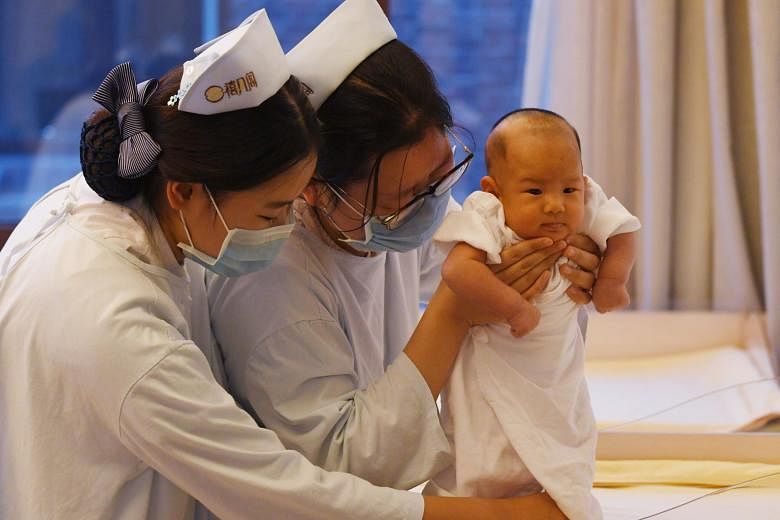BEIJING • China last year saw its highest number of births since 2000, a baby bump which officials attribute to the scrapping of the one-child policy.
The country welcomed 17.86 million new children last year, an annual increase of 7.9 per cent, with nearly half of the new births occurring in families which already had one child, according to the National Health and Family Planning Commission.
The figure was 1.31 million higher than in 2015.
The proportion of babies born to parents who already have a first child rose from around 30 per cent in 2013 to 45 per cent last year, said Mr Yang Wenzhuang, a division director with the commission.
Speaking at a press conference on Sunday, he attributed the increase to the easing of the family planning policies.
"It demonstrates that the universal second-child policy came in time and worked effectively," he said.
"Some regions, mostly large cities in eastern areas, began recording second children as comprising more than half of local newborns," he added.
According to statistics released earlier, new births were concentrated in the first half of the year, before the policy could have had an effect.
In addition, 2016 was the Chinese Year of the Monkey - considered a particularly auspicious zodiac sign to be born under.
Chinese media has reported that interest in larger flats and bigger cars has surged following the scrapping of the one-child policy.
From medical care to clothing, toys and education, all the related industries have seen a boom in their businesses, Guangzhou Daily said.
Since the late 1970s, strict measures in the world's most populous country restricted most couples - except ethnic minorities and some in the rural areas - to only one child, with violators facing stiff fines and even forced abortions.
-
Impact on population
-
By 2050, the two-child policy is expected to bring about an extra 30 million working-age people and reduce China's ageing rate by 2 per cent, projections by the National Health and Family Planning Commission have shown.
The policy is expected to help bring forward China's population peak by two years to 2029, when there will be 1.45 billion people, the commission has said.
Then the size of the population will start tapering off, becoming stable at around 1.38 billion, compared with around 1.2 billion without the policy change, it said.
CHINA DAILY/ASIA NEWS NETWORK
The restrictions were gradually loosened in recent years in response to concerns about an ageing population and shrinking workforce.
In 2014, couples were allowed a second child if one parent was an only child.
In October 2015, China's top leadership approved the abolition of the one-child policy, allowing all couples to have a second child. The new policy took effect nationwide from January last year.
Nevertheless, the financial costs of a second child have stopped many parents from pursuing the option.
Mr Shi Hua, 37, was over the moon when his second daughter was born last month, but he estimates that the new addition to the family will cost around 20,000 yuan (S$4,100) every year.
"Having two children means that neither will be lonely as they grow up, but even if the government allowed it, I wouldn't want more. Two is more than enough," he said.
A 2015 survey by the commission found that nearly 75 per cent of respondents were reluctant to have a second baby, largely due to economic burdens.
Other reasons include age of the parents, impact on career development and a shortage of caregivers.
Mr Yang said the government might have to consider incentives for people to have more children. He suggested measures such as favourable tax policies and longer maternity leave.
Experts have said that a further relaxation of family planning rules is expected to ease the population challenges China is facing.
"Judging from the experiences of some other countries, with people continuously delaying marriage and pregnancy, it is possible that Chinese people's willingness to give birth will continue to decrease," said Mr Zhang Chewei, director of the Population and Labour Economics Institute of the Chinese Academy of Social Sciences.
"China may need to further relax its family-planning policy in the future, and it may even abolish restrictions."
AGENCE FRANCE-PRESSE, XINHUA, CHINA DAILY/ASIA NEWS NETWORK

